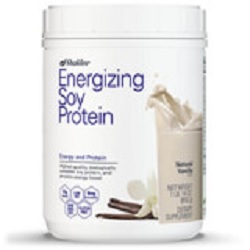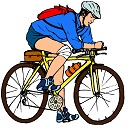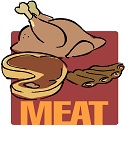The Purpose of Protein
There's a lot of information, and misinformation, being reported about various supposedly "essential" nutrients these days, and protein is no exception. We see articles which tell us we should eat a diet high in protein, and we see ads which tell us that we need to enrich our hair with protein.
 However, most of us have little idea of why we need protein, or what it can do for us. In fact, in light of all the noise surrounding this particularly well-hyped nutrient, it could be easy to just toss it off as another fad term, or something that people want us to believe is important...usually so they can sell us something. However, most of us have little idea of why we need protein, or what it can do for us. In fact, in light of all the noise surrounding this particularly well-hyped nutrient, it could be easy to just toss it off as another fad term, or something that people want us to believe is important...usually so they can sell us something.
Well, there ARE many, many people offering to sell fitness products containing protein in a lot of different formulations, for a lot of different reasons and uses, but there are some facts about protein that it would be well for you to know.
One simple fact is that you could say that protein, after water, is possibly THE most important nutrient we take in as a part of our diet.
Protein is an important part of every body cell. Whether you are talking about your hair and nails, or your heart and lungs, you are talking about a body part which requires protein for its existence and healthy function. In fact, not only do these things NOT exist if there is not protein, they cannot be repaired, or even function properly without it.
 Additionally, protein is often referred to, and rightly so, as the building block of bones, muscles, skin, cartilage, and blood. Some people already grasp at least some of this, but very few realize that the body also uses protein to make enzymes, hormones, and various other chemicals necessary to health and normal activity. Protein also helps provide the body with energy to operate and function. Additionally, protein is often referred to, and rightly so, as the building block of bones, muscles, skin, cartilage, and blood. Some people already grasp at least some of this, but very few realize that the body also uses protein to make enzymes, hormones, and various other chemicals necessary to health and normal activity. Protein also helps provide the body with energy to operate and function.
Protein is considered a macronutrient, i.e. the body needs relatively large amounts of it to function properly. Since the body cannot "store" protein, except that a muscle or organ is made of it, there are no stockpiles on which the body can draw when protein is needed for energy, repair, or function.
Also, while many organisms can manufacture the 20 proteins needed...we humans, sadly, are not one of those organisms and must constantly replenish our supply of this vital nutrient.
An unfortunate by-product of all of this is, that should our supply of protein drop below the level required by the body, it will steal it from somewhere else within the body.
This is one reason many diets are unsuccessful.
In most diets, the dieter restricts the intake of foods, often including those containing protein which the body needs. If the diet lasts for any length of time, the body will begin to take the protein it needs to make or repair organs and tissue from other parts of the body...often the muscle. It is lean muscle mass (made with protein) which helps the body burn calories. Depriving the body of lean muscle mass makes it harder to lose weight...at least to lose fat.
If this continues too long, severe damage can be done to the body, its organs, and the
individual's health. In extreme instances, death has even occurred. Not too surprising when you realize that one of the muscles that may be robbed of protein is the heart.
 While many can get adequate protein from a normal diet, there are some who have difficulty getting the protein they need simply through the food they eat. These people may want to make use of protein supplements to augment their regular diet. Additionally, in order to get the protein they need, some people may have to take in more calories than they use, resulting in an unhealthy weight gain. Again, using a protein supplement may help them get the protein they need without having to take in as many calories. While many can get adequate protein from a normal diet, there are some who have difficulty getting the protein they need simply through the food they eat. These people may want to make use of protein supplements to augment their regular diet. Additionally, in order to get the protein they need, some people may have to take in more calories than they use, resulting in an unhealthy weight gain. Again, using a protein supplement may help them get the protein they need without having to take in as many calories.
Another possible reason for using supplementary protein is that eating a high-protein diet often means NOT eating, or not being able to eat, such nutrient rich and important foods as fresh fruits, vegetables, and whole-grains.
When it comes to natural sources of protein, processed meats, incredibly common in our diets, are believed by many researchers to create health hazards and have been linked to increased risk of type 2 diabetes, cardiovascular disease, and colorectal cancer.
The best natural sources of protein are fish (which can also provide other valuable nutients, such as Omega-3 fatty acids), poultry, beans, nuts (I am munching on some as I write this), and whole grains.
In most cases, nature knows best, and, if possible, you should get your protein from these natural sources. However, remember that there are many excellent protein supplements available if you feel it necessary to make sure that you are getting the "building blocks" you need to keep your body functioning at its optimum level.
Return to Natural Products for Health and Home
More Natural Health Articles | About Shaklee Energizing Soy Protein
Related Article: Protein for Health and Fitness
The Purpose of Protein
Page Updated May 4, 2025
Web Page Copyright 2025 by Donovan Baldwin
|

